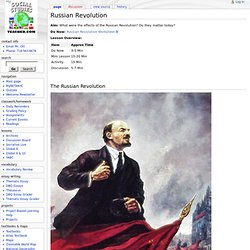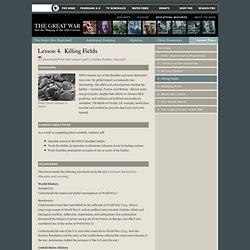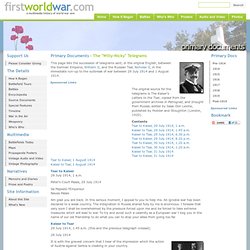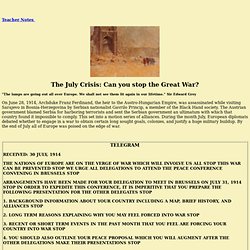

WWI Russian Revolutions lesson plan.doc. Russian Revolution - Mr Ott's Classroom Wiki. Aim: What were the effects of the Russian Revolution?

Do they matter today? Do Now: Russian Revolution Worksheet Lesson Overview: The Russian Revolution Causes: Throughout the 19th century, Russian Czars attempted to westernize and industrialize, without also importing French Revolution liberal ideas. A small revolution in 1905 forced Czar Nicholas II to enact some minor reforms, however, these did not last.
Effects: Russia became the first country to base its government on the writings of Karl Marx. Classwork & Homework Lesson PowerPoint: The Russian Revolution Lesson PowerPoint View Online: Russian Revolution Lesson Video: Russian Revolution Timeline Lesson Activity: Russian Revolution Activity Homework: Communism Worksheet. The Great War . Educational Resources . Lesson Plan 4. Download/Print this Lesson (pdf) | Adobe Reader required WWI remains one of the bloodiest and most destructive wars ever.

Its global impact on humanity was devastating. The allied and central powers leading the battles -- Germany, France, and Britain - did not make any great gains, despite their efforts to advance their positions, and suffered and inflicted extraordinary casualties. The Battle of Verdun, for example, lasted nine months and resulted in 300,000 dead and 7500,000 injured. As a result of completing these activities, students will: Describe several of the WWI's bloodiest battles.Track the battles' progression to determine advances made by leading nations.Write frontline journalistic accounts of one or more of the battles.
This lesson meets the following standards set by the Mid-Continent Research for Education and Learning: World HistoryStandard 39 Understands the causes and global consequences of World War I 3 to 4 classroom periods (with some research and writing done at home) History: World War One. Unit 11: World War I & Russian Revolution - CP World History. Unit 14: World War I & Russian Revolution - World History. Primary Documents - The "Willy-Nicky" Telegrams. This page lists the succession of telegrams sent, in the original English, between the German Emperor, Wilhelm II, and the Russian Tsar, Nicholas II, in the immediate run-up to the outbreak of war between 29 July 1914 and 1 August 1914.

The original source for the telegrams is The Kaiser's Letters to the Tsar, copied from the government archives in Petrograd, and brought from Russia, edited by Isaac Don Levine, published by Hodder and Stoughton (London, 1920). Contents Tsar to Kaiser, 29 July 1914, 1 a.m. Kaiser to Tsar, 29 July 1914, 1.45 a.m. Kaiser to Tsar, 29 July 1914, 6.30 p.m. Tsar to Kaiser, 29 July 1914, 8.20 p.m. Tsar to Kaiser 29 July 1914, 1 a.m. Peter's Court Palais, 29 July 1914 Sa Majesté l'Empereur Neues Palais Am glad you are back. Kaiser to Tsar 29 July 1914, 1.45 a.m. 28 July 1914 It is with the gravest concern that I hear of the impression which the action of Austria against Serbia is creating in your country.
Your very sincere and devoted friend and cousin Willy Nicky. Archdukes, Cynicism, and World War I: Crash Course World History #36. The July Crisis: Can You Stop The Great War? "The lamps are going out all over Europe.

We shall not see them lit again in our lifetime. " Sir Edward Grey On June 28, 1914, Archduke Franz Ferdinand, the heir to the Austro-Hungarian Empire, was assassinated while visiting Sarajevo in Bosnia-Herzegovina by Serbian nationalist Gavrilo Princip, a member of the Black Hand society. The Austrian government blamed Serbia for harboring terrorists and sent the Serbian government an ultimatum with which that country found it impossible to comply. This set into a motion series of alliances. Task The date is July 30, 1914 and the situation is critical when you receive the bove telegram. The Process Step1: Your team is a diplomatic advisory group representing one of the following: Austro-Hungarian Empire, Germany, France, Great Britain, Russia, Italy, and Ottoman Empire. All students should take notes on these three topics: background, long term reasons, and short term reasons in their journals. Resources Assassination in Sarajevo (